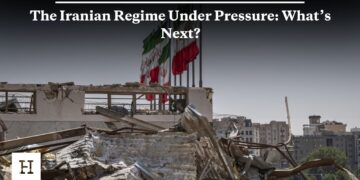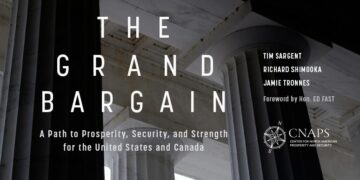This article originally appeared in the Globe and Mail.
By Christian Leuprecht, December 16, 2024
The dreaded moment is upon us: president-elect Donald Trump is linking Canada-U.S. trade to national security, the border, and defence spending. Illicit cross-border trade vectors are now a strategic threat to the United States. Free trade and Canadian prosperity hang in the balance.
However, the supply-chain interdependency of U.S. states with Canada and business ties to incoming U.S. cabinet members will limit Mr. Trump’s tariff-negotiation leverage. Mr. Trump’s first trade representative, Robert Lighthizer, understood that the answer to bilateral problems is (still) trade within North America. NAFTA’s renegotiation during Mr. Trump’s first term actually bolstered the trilateral trade relationship through the new USMCA agreement. Canada and Mexico may yet again bargain away Mr. Trump’s threat of tariffs in exchange for concessions on illegal migration, narcotics enforcement, and organized crime.
The recent annual report to Congress from the U.S.-China Economic and Security Review Commission highlights systemic supply chain risk to the U.S. Canada has become a haven for transnational criminality while frustrating U.S. law enforcement. Counterfeit products, slave labour and illicit goods, notably including precursor chemicals for fentanyl, are being sold to the U.S. market and overseas from Canada and Mexico.
The fentanyl crisis is causing 80,000 Americans to die from overdoses each year. Mr. Trump sees this “Reverse Opium War” as a grey-zone tactic, and Canada’s lax approach to financial crime as an enabler of hybrid warfare by China. In aiding and abetting the flows of criminal money, some believe that U.S. subsidiaries of Canada’s often complacent financial sector have been co-opted as part of China’s playbook to weaken the U.S.
Mr. Trump is also concerned that on Justin Trudeau’s watch, Canadian airports have become gateways for southbound migrants and alleged terrorists. Migrant encounters along Canada’s border with the U.S. have been growing exponentially. That Mr. Trump picked a border czar who hails from the U.S. Border Patrol’s Swanton Sector, the preferred pathway for irregular migrants en route from Canada to the U.S., by way of New York, Vermont and New Hampshire, is no coincidence. Tom Homan deems the Canadian border an “extreme” vulnerability.
Canada’s federal government has viable options to address U.S. concerns: Greater policy rigour about admittance into Canada in the first place, so as to reduce the southbound flow of migrants. Slow inbound immigration. Reduce and enforce visitor and student visas. Track and enforce deportation orders on irregular migrants. Contain the proliferation of organized crime syndicates operating in Canada. Get serious about financial crime, Canadian ports transshipping fentanyl, and reforming the due diligence of Canadian banks. In addition to a surge in RCMP and Canada Border Services Agency resources, possibly deploy the Canadian Armed Forces to help patrol the border (using “aid to the civil power” legal provisions) and authorize them to detain suspected migrants between official border crossings.
Those options fall within the exclusive remit of Canada’s federal government, but they would require changes to problematic federal policies. Decisive measures would require a degree of focus on follow-up and implementation greater than this government has a predilection to muster. The government would actually have to make a serious commitment to spend on security, intelligence and defence, and would also have to grow an already bloated federal payroll.
True to form, the Prime Minister and his closest advisers are responding with performative announcements that are already being panned by Mr. Trump’s allies: for example, other than the military, Canada lacks in the drones and helicopters required to allocate to border security, has little capacity to fly them, and flying them in the Swanton sector would be a risk to air traffic in North America’s densest cross-border aviation corridor.
Since the Kingston Dispensation in 1938, good neighbourly relations have been premised on mutual responsibility that neither country become a strategic threat to the other. Much like Canada’s response to the attacks of Sept. 11, 2001, the Smart Border Declaration, the Canadian government should promptly initiate a new round of binational discussions to reassure our American neighbours that Canada has their back.
Christian Leuprecht is professor at the Royal Military College and Queen’s University, senior fellow at the Macdonald-Laurier Institute, and co-editor of Security. Cooperation. Governance: The Canada-United States Open Border Paradox.








